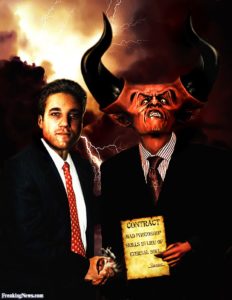The Deal with the Devil
Today I’m going to talk about the trope of making a deal with the Devil. We’ll go over where such a story idea came from and what part of that kind of story is realistic in terms of what the Bible says about Satan, and what’s not. Then we’ll circle around to mentioning some story opportunities for Christian writers of speculative fiction who wish to feature “deals” for souls (or deals for other things) in stories.
Probably the most famous treatment of making a deal with the Devil is nowhere close to the only use of this trope. Especially in the 1800s and early 1900s there were dozens of stories that used this story device. While this type of story is a lot less popular now than it once was, it’s still pretty common. I think there’s even a Simpson’s episode where Homer agreed to sell his soul for a doughnut (but he couldn’t sell it, because Marge owns his soul…).
Note that these stories all tend to have some elements in common. There’s a negotiation, a contract of some kind is usually drawn up, typically in blood, supernatural power of some kind from Satan is given, in exchange, normally, for an immortal soul. (You could write stories about deals with God, but as a story idea deals with God are limited by the fact we know God is eternally righteous and just…)

Image credit: Freakingnews.com
But of course the most famous treatment of this story is also widely considered the greatest play ever written in German. Johann Wolfgang von Goethe wrote a tale about the scholar Heinrich Faust, whose desire to gain knowledge was so great that he agreed to sell his soul for the ability to know more truth. Though this in turn stems from the earlier Christopher Marlowe play in English, in which Faust has the demon Mephistopheles provide him the ability to work magic for twenty-four years before having to hand over his soul, which he uses to pull pranks and otherwise please himself in various ways.
Even older than Goethe’s play Faust in 1808, which greatly popularized the subsequent fantasy trope of making a deal with the devil, even older than Christopher Marlowe’s play The Tragical History of the Life and Death of Doctor Faustus (first performed in 1592), is the story of Theophilus of Adana from the 6th Century. This account doesn’t come from an obscure village of the European “Dark Ages,” because Adana was a Greek-speaking metropolis in what is Turkey in modern times and was part of the still-civilized world. That’s because Adana was part of what we call today “The Byzantine Empire,” which never really experienced the Dark Ages (BTW, the “Byzantines” called themselves “Romans,” not “Byzantines”).
There are numerous variations in the story of Theophilus, but the most basic one is that he was elected to be a Christian bishop, but in a show of humility turned the office down. Then, when his successor as a bishop denied him a position as an archdeacon, Theophilus sought out an old practitioner of magic (either a spiritualist or a necromancer) to put him in contact with Satan. Satan then offered to get him the job of archdeacon back, but he first had to sign a contract in blood denying both Jesus and the Virgin Mary, in effect denying his own salvation (as opposed to giving his soul directly to Satan). Eventually Theophilus regretted his decision and sought to repent, which he finally managed to do, aided by a visitation from the Virgin Mary.
This story is seen as apocryphal by pretty much everyone nowadays, but some Christian thinkers took it seriously in the Middle Ages, and used the tale as extra-Biblical grounds to establish the importance of Mary as an arbiter of repentance (according to Wikipedia Peter Damian, Bernard of Clairvaux, Anthony of Padua, Bonaventure and later on Alphonsus Liguori thought this).
A later Medieval legend relates how Saint Wolfgang tricked a demon (Urian–who is perhaps really the Devil) into magically creating a magnificent church building in the wilderness at the cost of promising the first soul that enters the church would be his. (The first soul who enters the church belongs a blood-thirsty wolf, so the Devil gets cheated, because he wanted a human soul.) Which is a similar story in some ways to that of Theophilus of Adana.

Saint Wolfgang and the Devil by Michael Pacher (painted between 1471 and 1475).
The tale of Theophilus is also credited with linking witchcraft to Satan in Christian thought, but the argument that Satan has supernatural powers to hand out as he wishes can be made by the Bible alone. For example, if we combine the Devil taking Jesus to the pinnacle of the temple, and then showing him the kingdoms of the world, plus Satan striking down Job and his family by means both natural and supernatural (Job 1 and 2), we see just a few of many possible demonstrations of Satan’s supernatural power. That worshipers of idols make fellowship with demons (who are under Satan’s command per Luke 11:15-18) is stated in both the Old Testament (2 Chronicles 11:15)(at least in some translations) and the New (I Corinthians 10:20)–and these forms of “high” worship were often associated with magic. But “low” magic outside of temples was also associated with demonic power in the Bible (see Acts 13:8-11 and 16:16). And of course Revelation 12-13 shows the “Beast” receiving power to do signs on the Earth from the “Dragon,” a.k.a. Satan.
So, Satan clearly has supernatural power according to the Bible and the ability to give that power to human beings on Earth, at least at times. Though on the other hand, it’s true that fighting the supernatural power of Satan is never a major preoccupation of the apostles. It’s only something that comes up from time to time…so how it can be true that the power of Satan is both something to take seriously and also something the apostles didn’t have to worry about very often? That seems a puzzler, but it’s beyond the scope of this article. (I’ll address this apparent contradiction in a later post.)
But to get back to the topic, Satan really does have the power to perform miraculous works and hand out that power–Jesus really was teleported to the top of the Temple somehow, just as Job’s family really was struck down by power Satan exercised. And that power clearly was exercised by certain human beings based on contact with spirits/demons (note I said “contact” not “a contract”). But what about the contract in blood? Is that Biblical at all?
That’s actually a big topic–there’s a long history of written contracts being made that were accompanied with animal sacrifices (obviously to include blood) both in the sacrificial system of the Hebrew Bible and also in nations outside of the ancient Israelites. There’s also been a number of cultures who associated blood with a firm oath or promise–it’s maybe more than a bit hackneyed as a story device, but being a “blood brother” by spilling and mixing blood really was a thing in many places in the world and still is sometimes. Hebrews 9:12-15 says Jesus entered the heavenly Most Holy Place with his own blood–for the purpose of sealing a new covenant with God. Covenants are often written of course–plus the Greek phrase “new covenant” in Hebrews 9 (διαθήκης καινῆς) is identical to the term “new testament” in Biblical Greek–or perhaps I should say, “New Testament.” Though nothing in the Bible says either the New Testament or the Old were written in blood. So is the idea of a contract in blood Biblical? Eh, sorta.
So the idea Satan has power to hand out seems totally legit according to the Bible and the contract in blood, while not directly a Bible concept, is pretty close. What about the rest of the selling-your-soul scenario? Does Satan need to make deals for people’s souls? Does a person have the ability to sell their soul in the first place?
A quick read of Matthew 16:26 might sound like it supports the idea that someone could make a deal for his or her soul: “For what profit is it to a man if he gains the whole world, and loses his own soul? Or what will a man give in exchange for his soul?” But in context, it’s saying the opposite. It’s saying there is no deal a human being can make to secure his or her soul–that in fact, the only way to save your soul is to follow Jesus (Matt 26:24-25). Your soul is not something you, as a human being, have any power to buy and sell. You can only effect your soul’s destiny by faith expressed in following Christ.
The Bible does say a Christian is “bought” via the death of Jesus in order to belong to God (I Cor 6:20), which might imply that without Christ your soul belongs to Satan anyway and God buys it back. But the Bible doesn’t say that directly and certainly we have no evidence that Satan gets to keep souls. Yes, Satan is called the Lord of those who do not believe (Ephesians 2:2), but the Devil is not the owner of hell or souls in punishment–God in fact prepared eternal punishment to send Satan to in the future (Matthew 25:41), rather than it being his home. While yes, it makes total sense to say Satan wants to see human souls in punishment with him (Revelation 12:12), it’s clear that God is the one who directs where souls go as the result of Divine justice (Revelation 20:11-15). Not the Devil.
In fact, I could make a solid case from the Bible that you don’t have a soul, but rather you are a soul. You are a soul who has a body, rather than a body who has a soul. But I’m not going to use up space here to make the case that your soul, as in your inner, spiritual self, is more you than your outer self, i.e. your body. That’s because in fact both body and soul (and spirit, too) are important and are intertwined so that the idea that only the soul or spirit (or both) matter and the body doesn’t isn’t a Christian doctrine, because Christianity expects a bodily resurrection (Acts 17:32).
Note that while the Bible never says the Devil owns anyone’s soul, it’s repeatedly said that Satan and the demons take ownership of people’s bodies (one example out of many, Matthew 12:43-45). Though it is true relatively little is said about demonic possession in the instructions to churches in the epistles, which I think means possession is not to be the primary focus of any Christian, yet the possibility of the Devil directly (Luke 22:3) or demons entering human bodies is an actual possibility that the Bible talks about.
So why don’t stories about a deal with the Devil feature people selling their bodies to Satan? Probably because there’s was a sense even hundreds of years ago that your soul may be something you don’t need right now–that maybe it only secures eternity for you–but your body you need right now. So you trade the eternal for the temporary in the classic setup. Which certainly points to something people actually do, though in a different way, by focusing on what this life has to offer and ignoring their need for reconciliation with God through Jesus Christ.
The “Deal with the Devil” therefore is a powerful trope, one that speaks to a reality of things people do in their lives, even if they can’t literally do exactly what the elements of the “deal” contain. Because people really do abandon the hope of eternity in favor the pleasures and successes of this life. And by juxtaposing a demon or the Devil into the story, you make it clear what the exchange is really all about. I also know for certain that at least at times people even pray to Satan and ask him for something in exchange for serving him (I know that because I tried it myself–yes, I really did–thank God for rescuing me from my youthful stupidity). Whether the people who try it really get what they ask for is another matter–but even if Satan helps people that doesn’t prove they are able to give up their soul in exchange. (Them believing Satan owns their soul, even if it’s not true, might be enough for the Devil.)
Note that even though we know Satan or a demon can possess a human body, I don’t think we know the exact route to possession from the Bible. Nor do I think we need to know–we know how to stay away from possession (something I’ll talk about in a later post) and that’s good enough. But it seems more likely that a person could choose to give up their body to Satan than their soul. However, it may not even be possible to give up control of the body at a whim. It might take more than that for someone to lose control of their flesh and blood.
But as a story idea, we could float a plot in which a person in exchange for magical powers or some other benefit for a certain length of time, gives over his or her body afterwards. The person in such a story could even offer up their soul, but the Devil could reject it in this hypothetical tale, mentioning that a deal for souls is fiction, but a deal for bodies is real. (I think that would be clever.)
On the topic of story ideas, I almost forgot to mention what is the most important account of a deal with Satan for someone who takes the Bible seriously, though I dropped a few references to it. Job.
The Book of Job is far older than even the Byzantine bit of fiction about Theophilus of Adana. Note it has a number of elements in common between it and the classic Deal with the Devil scenario. There was a negotiation–and a verbal contract–a human being was on the line–and Satan exercised supernatural power. But in Job, the negotiation was between God and Satan, not Job. And Satan’s goal was to get Job to sin, to curse God.
That hints at what I want to talk about next time, spiritual warfare for Christian writers of speculative fiction. Because it reveals at least one of Satan’s goals if not the main goal–to tempt or provoke people who are doing right into doing wrong.
But to get back on track to today’s topic, note how a story about a deal with the Devil could be different if we insert God into the tale. While we don’t want to insert heretical ideas into Christian fiction and we run that risk if we bring God into a tale, it should be possible to feature a story with a deal with the Devil in which God is involved that isn’t too wild in doctrine–perhaps a man wanting to sell his soul is directed by Satan to get a copy of the title for it from God first. Or perhaps in a different tale a woman’s “soul papers” could be faked and God would intervene in the story and point out the forgery. Or perhaps people could intend to make a deal with the Devil, but find they are actually negotiating with God. Among many other possibilities.
Overall, the “Deal with Devil,” while a much-used trope, has the virtue of demonstrating it’s possible to exchange temporary benefit for eternal loss. Which is true. While the classic trope supposes a number of things that either seem improbable or cannot be true at all, what is more likely to be true remains interesting fodder for potential stories.
So what do you think, readers? What’s your favorite story featuring a deal with the Devil? What other thoughts do you have on this topic?












































Yay, Faust! I have a series with a deal with the devil plot concept. It’s fantasy, though, and contains elements that aren’t often in previous Faust legends to my knowledge. As far as the ‘satan just needs people to BELIEVE he owns their souls’ part, that ends up being a plot point.
Something weird that I see involving stories of demons and especially Faust type stories is the idea of the demons actually eating people’s souls. Sometimes that’s because they’re disconnected from the Christian idea of souls and demons. Like, the ‘demons’ might actually be more like yokai and therefore not really within the Christian notion of demons at all.
One really interesting Faust ish story I’ve been reading recently is called Simon Sues. It’s a comic on Line Webtoon, and is basically a lawyer that helps people negotiate their contracts with demons and other spiritual beings so they don’t get eaten for breaking them.
Simon Sues sounds like an interesting story. And I like the fact the lawyer is trying to keep people from being eaten. Yes, something eating your body is a real possibility, as plenty of animals do, and we could easily imagine demons wanting to do! So that aspect adds to what could be at stake in this kind of story.
As for something eating your soul, that’s an interesting concept and might be fun to experiment with for a story, but I think in reality if a soul could be eaten then a person would cease to exist. Because we know that humans can have at the very least a new body in the resurrection according to the Bible and we know that body will not be like our own at this time (I Cor. 15:53). So our bodies can be literally eaten by sharks or bears or something and we will get a new body back. But I doubt our souls can be eaten in the same way–because there is no mention of any resurrection of souls in the Bible. (So if a soul got eaten, it would be seem to be gone, period.)
Though it might be interesting to imagine that souls can be resurrected, so that a demon could eat one, but then God could bring it back…
It’s free to read, though I will warn you that it is kind of dark/violent and since it’s only like…27 episodes in I think, I can’t make many promises about what the content will be further down the road. Right now the series is showing how Simon becomes a paranormal lawyer in the first place(at this point he’s still a student). Simon does try to be ethical in spite of being imperfect, though:
https://www.webtoons.com/en/thriller/simon-sues/list?title_no=1619&page=3
But it might be good for seeing a little more of how modern secular authors handle this kind of story.
And yeah, kinda agree on the souls getting eaten part. That’s why it was kind of weird for me when I started seeing stories of demons eating souls. And in a way it reduced the stakes. The whole reason why the soul part matters is because of its eternal aspects, and the idea that someone could get stuck in hell forever. If the soul isn’t eternal, it doesn’t always make the story have any higher stakes than it would have if it was just a mortal body living or dying.
There’s some fun possibilities with souls getting ‘eaten’, though. If they get eaten, maybe they just get swallowed up and trapped by the entity in question, giving off spiritual energy that the entity uses to grow stronger, and never getting torn apart, ‘killed’, or destroyed.
Of course, another aspect that demon and yokai stories often play on is them feeding off of negative emotional energy. So they could basically act like a parasite feeding off anger, or push someone to the brink that way they can devour all those nasty emotions at once.
Nice article! I’ve always liked Faust and the deal with the devil concept, though I’ve never used that trope. However, my current fantasy series has several times when God breaks in, either through internal voice, or in the last book, through a burning-bush type moment.
I’ve thought and prayed long and hard about what you unpacked toward the end of your article. If God is in my story as an actor, am I introducing heresy into my work?
I think the answer is no, though, in my case. It will be left to the reader to make that kind of determination, but God being the creator of an alternate dimension with magic, dragons, and fairies, has obviously been done before, and God does appear in alternate realities too, notably in Narnia, where God is central in the figure of Aslan. And in the Dragons of Starlight series by Bryan Davis.
I think I’m in good company. In mine, God instructs the young king to follow the instructions found in Deu 17:18 so that those in this alternate dimension will have the text of the Bible in their own world, so that they too can know the truth and it can set them free.
But the idea of God being in your book as an actor, though not a new concept, is an area to move with trepidation. Thanks for the warning.
Chris, thanks for the positive comments. And yes, I only meant to issue a warning–a literal reminder to check what you do. But clearly I do think it’s fine to include God in fiction if done right. I’ve done so myself. And will do so again, no doubt. 🙂
Chill, dude, I’m not *promoting* that as an interpretation, but it IS an interpretation. If you cant tell, I’m more interested in playing with ideas than I am in defending orthodoxy. Call it a side effect of my education in postmodern liberal arts.
But compare Job to the Greek story of Phryne. She was accused of blasphemy, IIRC, but her lawyer’s defense was to have her disrobe, because according to their system, hot people had the favor of the gods and look at how hot she is. (Insert joke about prosperity gospel.)
Job is more interesting, I think, because while his neighbors also tended to that sort of theory, it was a Point that Job had done nothing wrong.
Why do people suffer? The Greeks at least have the convenience of fickle jerk gods.
Also, reminds me of an anime I’m watching (because of course).
The Legend of Galactic Heroes basically pits the best of dictatorship against the worst of democracy. And it makes you wonder how loyal you’d be to an ideal when reality comes knocking on your door. What would be your price to make a deal with the devil? I’ve heard that people don’t fight for patriotism, they fight to help their buddies in the next foxhole. But this show does a good job of balancing cynicism with hopefulness and I do recommend.
But they killed off my waifu and I’m still upset about it 20 episodes later.